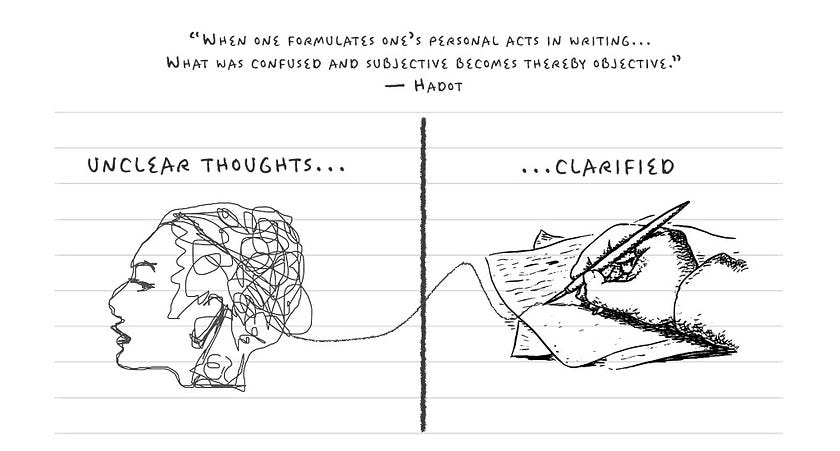Straightforward Stoicism to upgrade your perspective
It’s often said that if you can’t explain something in simple terms, then you don’t understand it well enough.
With this in mind, I decided to put myself to the test and see if I could boil down some of the most important Stoic exercises to their most basic form while still conveying their meaning.
Here are nine of the most impactful practices in Stoicism explained using the simplest of drawings.
(Note: For further context, if required, I have included related quotes and links to fuller explanations.)
1. The View from Above

Look down from above on the countless gatherings and countless ceremonies, and every sort of voyage in storm and calm, and the disputes between those being born, living together, and dying. Think also of the life that was lived by others long ago, and that will be lived after you, and that is being lived now in other countries; think of how many don’t know your name at all, how many will quickly forget it, how many who — perhaps praising you now — will soon be finding fault. Realize that being remembered has no value, nor does your reputation, nor anything else at all.
— Marcus Aurelius, Meditations 9.30
Full explanation and practical exercise: Experience the View from Above
2. The Dichotomy of Control

The chief task in life is simply this: to identify and separate matters so that I can say clearly to myself which are externals not under my control, and which have to do with the choices I actually control. Where then do I look for good and evil? Not to uncontrollable externals, but within myself to the choices that are my own.
— Epictetus, Discourses 2.5.4–5
Full explanation and practical exercise: What is the Dichotomy of Control?
3. Journaling

When one formulates one’s personal acts in writing, one is taken up by the machinery of reason, logic, and universality. What was confused and subjective becomes thereby objective.
— Hadot, Philosophy as a Way of Life
Full explanation and practical exercise: 9 Stoic Journal Prompts
4. Contemplation of Death

Let us prepare our minds as if we’d come to the very end of life, let us postpone nothing. Let us balance life’s books each day. … The one who puts the finishing touches on their life each day is never short of time.
— Seneca, Letter 101
Full explanation and practical exercise: What is Memento Mori?
5. Kindness and Helping Others

The reward for all the virtues lies in the virtues themselves, for they are not practiced with a view to recompense; the wages of a good deed is to have done it.
— Seneca, Letter 81
Full explanation and practical exercise: Do an Anonymous Act of Kindness
6. Wanting What You Have

And if you can’t stop prizing a lot of other things? Then you’ll never be free — free, independent, imperturbable. Because you’ll always be envious and jealous, afraid that people might come and take it all away from you. Plotting against those who have them — those things you prize. People who need those things are bound to be a mess — and bound to take out their frustrations on the gods. Whereas to respect your own mind — to prize it — will leave you satisfied with your own self.
— Marcus Aurelius, Meditations 6.16
Full explanation and practical exercise: How to Want What You Have
7. The Reserve Clause

If your impulse is without a “reserve clause”, failure at once becomes an evil to you as a rational creature. But once you accept that universal necessity, you cannot suffer harm nor even be thwarted. Indeed, nobody else can thwart the inner purposes of the mind. For it no fire can touch, nor steel, nor tyrant, nor public censure, nor anything whatsoever: a sphere once formed continues round and true.
— Marcus Aurelius, Meditations 8.41
Full explanation and practical exercise: What is the Reserve Clause?
8. Negative Visualization

Nothing happens to the wise man which he did not expect — we do not make him exempt from the chances of human life, but from its mistakes, nor does everything happen to him as he wished it would, but as he thought it would: now his first thought was that his purpose might meet with some resistance, and the pain of disappointed wishes must affect a man’s mind less severely if he has not been at all events confident of success.
— Seneca, On Tranquility Of Mind 13
Full explanation and practical exercise: What is Negative Visualization?
9. Acceptance / Amor Fati

Universe, whatever is consonant with you is consonant with me; if something is timely for you, it’s neither too early nor too late for me. Nature, everything is fruit to me that your seasons bring; everything comes from you, everything is contained in you, and everything returns to you.
— Marcus Aurelius, Meditations 4.23
Full explanation and practical exercise: What is Amor Fati?